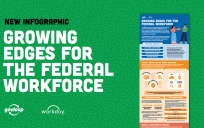This interview is part of a new DorobekINSIDER mini series with experts looking to help shape a management platform for the new administration. Check out all of the stories in the new series, Good Government Management, here.
It should come as no surprise that our next president will undoubtedly have to deal with constantly evolving IT, just like everyone else. The question is-how will he or she go about addressing IT on a grand scale? Will the new administration simply work on current IT projects or will the White House take on an IT leadership role?
Mark Forman, Global Public Sector Head at Unisys and former Federal Chief Information Officer, and Roger Baker, former Chief Information Officer at the Department of Veteran Affairs and the Department of Commerce, agree that making IT a priority for the next administration is key.
Forman and Baker sat down with Christopher Dorobek on the DorobekINSIDER program, as a part of the Good Government Management series, to discuss specifically what areas the new administration should focus on so as to better government’s role with IT.
“We are in another major technology turn. This technological turn is driving a lot of change in the way business operates and government has to change the way it operates in order to deliver similar quality service, at similar costs and efficiencies, to what the public expects,” Forman said.
In order to play ‘catch up’ to the private industry, leadership needs to understand the importance of technology. “The private sector has successfully utilized IT as a way to change business processes that it has become the fulcrum for how to create change. If you are going to change government, you are going to have to do it with technology,” Baker stated.
Additionally, Forman pointed out that the digital government movement is a change in the design model for how government services are delivered. Which is why government must realize that government’s business processes are directly linked to the IT programs currently in place. “If you change legacy IT without changing legacy business processes, you are going to automate a bad process,” Baker explained. “You can’t build tremendous IT with 1940s processes. You really have to look at the process and technology together.”
According to Forman and Baker, the next administration will need to get the human capital and procurement equation right in order to succeed. Government must employ the right people. “You cannot do highly innovative technology without the people that can drive that innovative technology,” Baker pointed out. Forman also shared that he believes the next administration will have to look at the sourcing strategy-what needs to be done in-house versus what we will hire contractors for or what do we buy from cloud providers as a service model. In other words, “we can’t look at HR and procurement in a vacuum. The next administration is going to have to rethink their sourcing strategy, figure out the mix of people they need, and what they need to buy to move forward,” Forman highlighted.
To contribute to the transition effort both Forman and Baker are heading the Transition Study Group for the American Council for Technology and Industry Advisory Council (ACT-IAC). The result will be transition briefings that will be available in April. These papers will include some ideas about what has been around and has worked, as well as some new ideas of thought. “The advice and research provided will shed some light on how to come up with good digital models, what are the relevant models, and what do you need to get the performance improvements similar to what we’ve seen in the private sector (when the private sector applied these models and were successful),” Forman said.
IT will continue to play an important role in government. Hopefully, these transition briefings will benefit all involved- especially current candidates running in the presidential election.





Leave a Reply
You must be logged in to post a comment.